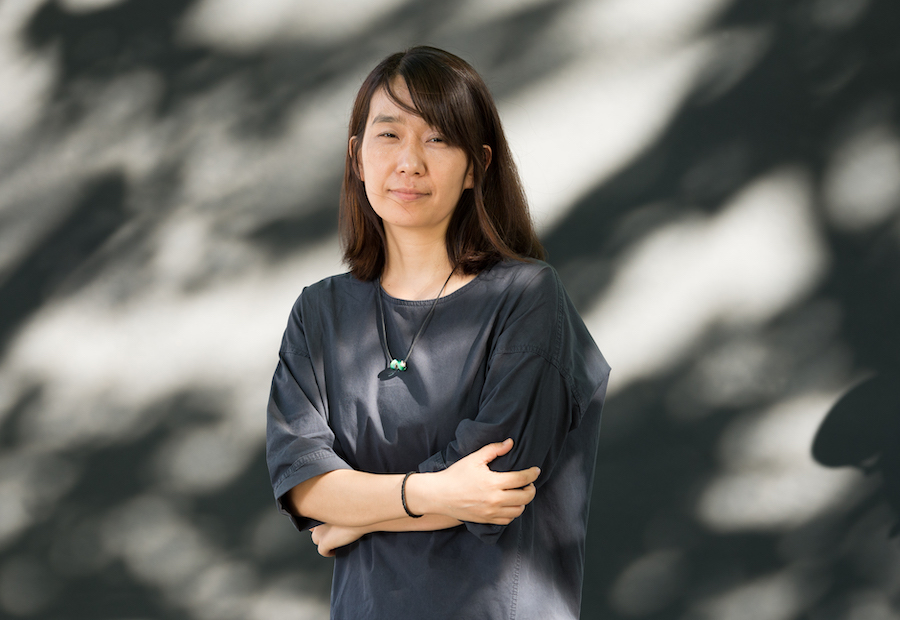WOMEN WE LOVE: Han Kang

On December 10, 2024, prestigious Nobel Prize for Literature arrived, and with it, a great writer to discover: Han Kang.
Who is she, and what do we know about her? Han Kang is a Southern Korean writer, the first South Korean citizen, and the first Asian woman writer to win the prestigious award of the Swedish Academy. Born in Gwangju in 1970 but moved at age 9 to Seoul, her family comes from a writing background, as her father is a writer. She began her career as a writer with a poem called "Winter in Seoul", published in 1993, and then published a collection of poems and short stories. In 1995, she published her first novel, A Love of Yeosu. From that moment, she published several books, most of which were not translated into English, which made her a relevant person in the South Korean literary scene. She won multiple awards in her country: the Korean Novel Award, the Yi Sang Literary Award, the Dong-in Literary Award, and the Kim Yu-jeong Literary Award, among many others.
In the international field, her first novel translated into English was The Vegetarian, published in 2007 and translated in 2015. Along with her creative translator, Deborah Smith, it was the Booker Prize winner in 2016. Other international awards are the prestigious Italian award, the Malaparte Prize (2017), and two important French awards: Prix Médicis (2023) and Émile Guimet Prize for Asian Literature (2024). And most recently, in 2024, she was awarded the Nobel Prize for Literature. The committee's citation reads: "For her intense poetic prose that confronts historical traumas and exposes the fragility of human life… She has a unique awareness of the connections between body and soul, the living and the dead, and in her poetic and experimental style has become an innovator in contemporary prose."
Her novels portray turbulent moments in South Korea's recent history, but above all, it focuses on the vulnerable people who suffer the brutality of the events. Her style is always emotional, feminist, and supportive. She explained this herself in a 2020 interview: "My novels explore human suffering":
For those unfamiliar with her work, these are the pivotal novels by Han Kang, all of which have been translated into English.
1. The Vegetarian
A novel published in English in 2015, the New York Times ranked it 44th among the 100 best novels of the century. The plot is about a woman who refuses to eat meat because, as Kang herself explains, "She wants to reject human brutality."
Lest anyone be confused, the novel has nothing to do with healthy food, although the title is good advertising bait. It is a stark and brutal portrait of female rebellion against patriarchy. Such is the submission of the protagonist Yeonghye to her husband that, when she decides to stop eating meat, it is perceived as an unacceptable rebellion, and the response of her husband and the village men is very violent. In this way, we realize that the decision not to eat meat is not a matter of food, but the true metamorphosis of a subjugated woman who decides to free herself from all oppression.
"This compact, exquisite and disturbing book will linger long in the minds, and maybe the dreams, of its readers," Boyd Tonkin, the chairman of the Booker judging panel, said when the book won the International Booker Prize in 2016. The English translation of the novel opened heated debates for its interpretive version.
2. Greek Lessons
A 160-page short but intense story about loss -- loss of sight and speech. It is the story of two anonymous people: a woman who has retreated into muteness after sexual abuse and decides to study a dead language to recover it, and a man who is slowly losing his sight because of a hereditary disease. With sensitive prose, Kang deals with the relationship between two people who are in a moment of hopelessness. They are two desperate loners who meet and establish a delicate relationship.
In an article by The Guardian, Em Strangwrites, "There are also similarities between the female character in Greek Lessons and Kang's International Booker prize-winning novel The Vegetarian. The women are broken, furious, violated, overwhelmed, and isolated." Once again, Hang portrays vulnerable human beings who help each other and address the female question.
3. Human Acts
Considered the most significant novel of her career by many literary critics, the story is about Dong-ho, a victim of the Gwangju uprising in May 1980 in response to the coup that installed a military dictatorship in South Korea. Kang grew up in Gwangju, and an acquaintance from her past appears in the novel. It is an accurate and intense description of some brutal moments in the history of her country, which Kang portrays with great sensitivity. Her text is subtle and straightforward, and it won the Manhae Prize for Literature. It has been translated into over 14 languages.
4. The White Book
A unique literary creation that emerged from the grief of an unnamed sister, it is a eulogy of someone's sister dying within 2 hours of being born. The novel, a finalist for the 2018 International Booker Prize, is a meditation with autobiographical and transcendent airs that, around the loss of her sister, reflects on life and death. In the book, she describes 65 white objects, considering white as the scene of purity.
5. We Do Not Part
Her her latest novel is about a writer who investigates the Jejú island revolt against the Cold War division of the Korean peninsula and describes the consequences suffered by her friend's family. It will be published in English in 2025.
As for the cinema, only two film adaptations of Kang's novels have been brought to the big screen. Vegetarian (2009), a film about her book of the same title, was successful in South Korea. The film, directed by Lim Woo-Seong, was released at the Busan International Film Festival in 2009 and was invited to compete at the 2010 Sundance Film Festival.
Another film is Scars (2011), based on Baby Buddha (1999), a novel without English translation. It is about an emotionally numb woman and a man who want to achieve perfection. Han Kang wanted to adapt Human Acts, the novel about her experience during the Gwangju Democratization Movement; it has also been ranked first in the most wished-to-see adapted film.
Without a doubt, Han Kang is a writer to discover. It is hoped that her recent Nobel Prize Award will allow all her novels to be in English. And we also have to wait for more film adaptations. Her literature opens up a world of sensitivity towards the most vulnerable who suffer the horrors of oppression -- a deep look into the inner abysses of human beings.



